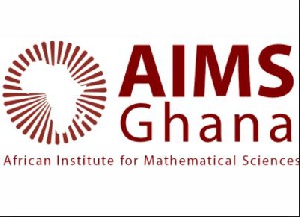The African Institute for Mathematical Sciences (AIMS) Ghana turned down many qualified applicants who sought admission to pursue master’s degrees in Mathematical Science for the 2016/17 academic year due to limited facilities.
Professor Emmanuel Kwame Essel, Academic Director at AIMS, told the Ghana News Agency (GNA) in an interview that the academic institution continued to receive large numbers of applications for admission each year but could only admit few.
“For the 2016/17 academic year for instance, AIMS received a total 660 applications across Africa out of which only 50 applicants were admitted because we do not have enough facilities,” he said.
Prof. Essel, therefore, appealed to the Government through the Ghana Education Trust Fund (GETFund) and industries to support the Institute to put up a new campus to enable it to admit more African students interested in mathematics and science.
He said though the Catholic Church had given the Institute a 5-acre land at Saltpond to build an ultra-modern campus, there were insufficient funds to start the project.
AIMS is a non-profit Pan-African network of Centres of Excellence in Post-graduate education, research and outreach in mathematical sciences that equip students with knowledge and skills needed to solve mathematical problems in key areas of development in Africa.
Operating as a partnership between African and international universities, AIMS Ghana provides an innovative and relevant curriculum within a unique 24-hour learning environment.
Prof Essel said AIMS existed to promote mathematics and science in Africa, recruit and train talented students and teachers and to build capacity for African initiatives in education, research, and technology.
He said AIMS-Ghana, has trained 201 mathematical science students made up of 134 males and 67 females from 19 countries in Africa since 2013, and were contributing to scientific teaching, research and industry development.
According to him, Mathematics, Science and Technology were powerful forces for progress in the global society and the global economy, noting that for Africa to fully benefit from them, it must build a strong indigenous capacity in both.
Prof Essel mentioned that AIMS over the past years had contributed immensely to solving problems in farming, fishing, education, health and other sectors of the local economy as well as some economic problems in Africa.
He expressed appreciation to the Catholic Church and the Government of Ghana for the continual support and called on others to come to the aid of the institution to admit more students.
General News of Tuesday, 11 July 2017
Source: GNA













